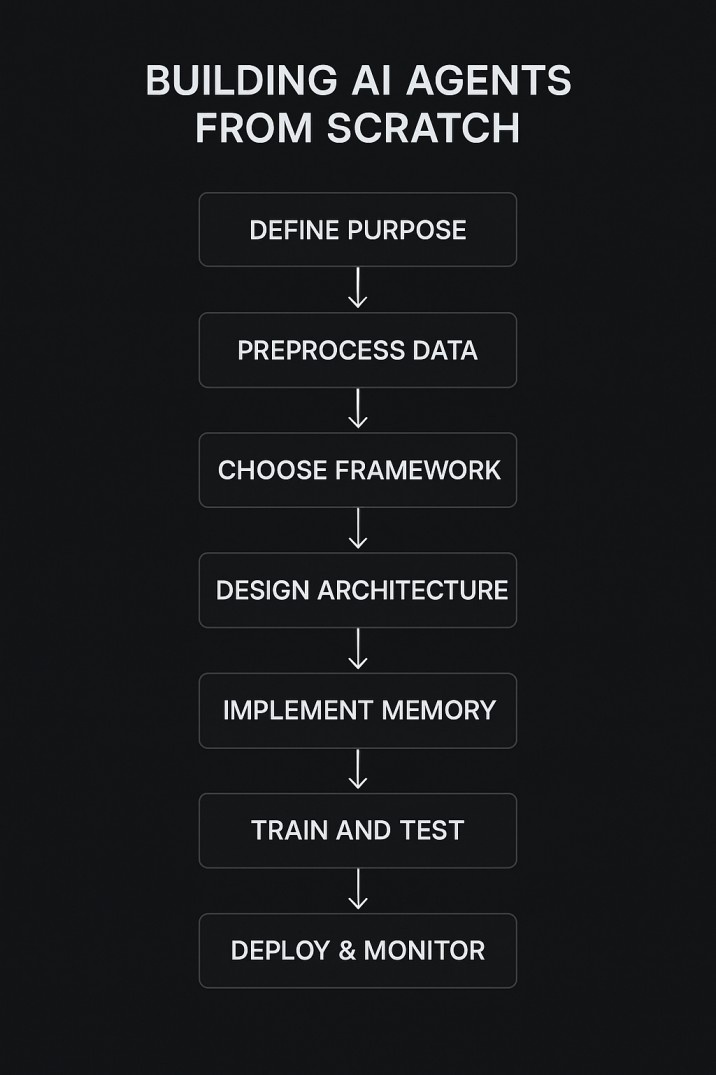Introduction — What Are AI Agents and Why Build Them?
In 2025, AI agents have evolved into indispensable tools that power automation, boost productivity, and streamline complex tasks. Whether you want to integrate AI into your business or experiment with your own agentic AI, understanding the core principles of what is AI agents and how to build AI agents from scratch is vital. In this practical, step-by-step guide, we’ll dive into the future of work with AI agents and show you exactly how to design, train, and deploy these agents for real-world impact.
Why Build AI Agents?
Agents in AI empower businesses and developers by:
- Reducing manual workloads with automation
- Enabling scalable, intelligent decision-making
- Connecting disparate tools into a seamless workflow
- Preparing you for the future of work with AI agents
By leveraging tools like LangChain for AI agents — Everything You Need to Know, What Are AI Agents? — The Ultimate Beginner's Guide, and the Google AI Studio & Cursor AI platform, you can kickstart your journey toward becoming an AI agent developer.
Key Concepts Before You Begin
Agentic AI vs Generative AI — What’s the Difference?
Before you build AI agents, it’s important to understand the distinctions between these types of AI. Agentic AI aims for autonomous, task-driven behavior, while generative AI focuses on creating content like text or images. Check out our post on Agentic AI vs AI Agents — What’s the Difference & Why It Matters for a deeper dive.
Google Agent Development Kit (Google ADK)
Google’s newly released Google Agent Development Kit AI agents simplifies the process of building agents with robust APIs and pre-trained models. Consider it your starting point if you want to build AI agents from scratch quickly and efficiently.
Step-by-Step Guide to Build AI Agents From Scratch
Step 1: Define the Purpose of Your AI Agent
Start by identifying the problem you want your agent to solve. Some common use cases:
- Customer support automation (Cloudflare AI agents can help here)
- Content generation (blogs, product descriptions)
- Data analysis & reporting automation
Step 2: Gather and Preprocess Data
Agents need training data. Gather data relevant to your niche — this could be customer chat logs, transaction data, or documents. Normalize this data so your model can ingest it properly.
Step 3: Choose a Framework or Platform
Leverage existing platforms like:
- LangChain for chaining multiple tools together.
- Google AI Studio for developing agents with powerful LLMs.
- n8n AI agents for zero-code automation recipes — read more in our article on n8n AI Agents — Breakout Automation Workflows That Save You Hours.
Step 4: Design the Agent’s Architecture
Agents require an architecture that defines their:
- Input Processing: How your agent parses queries.
- Reasoning Engine: How it derives next steps — often powered by a large language model.
- Tool Access: Define APIs and tools the agent can use.
Step 5: Implement Memory and State
Memory is crucial for continuity. Implement a short-term memory (e.g. conversation history) and long-term memory (e.g. a database). Tools like Phidata or the new Google ADK can help. See our article on Manus AI and Manus AI Agents — Everything You Need to Know for more examples.
Step 6: Train and Test the Agent
Train the agent on your data. Simulate conversations and test its reasoning capability. Measure success by looking at:
- Accuracy (% of correct responses)
- Time to completion for tasks
- User satisfaction ratings
Step 7: Deploy & Monitor
When you’re satisfied with your agent’s behavior, deploy it to the appropriate channel — a website chatbot, internal dashboard, or messaging platform. Continually monitor its performance, update data, and iterate.

Best AI Agents to Build in 2025
Here are some trending types of agents you could implement:
- Autonomous AI Assistants: Powered by open AI practical guides to building agents — free and paid options available.
- Crypto and Finance Bots: Integrating agents into blockchain-based systems — explore our article on AI Agents and Crypto — How AI Agents Are Transforming Web3.
- Vertical AI Agents: Industry-specific bots tailored for healthcare, legal, or marketing — read more in Vertical AI Agents — The Breakout Trend You Need to Know.
Future of Work with AI Agents — What’s Next?
The future of work with AI agents will be driven by hyper-specialized tools, on-demand marketplaces, and seamless automation across industries. Breakout platforms like Deepseek, Manus AI agents, and Google AI Studio are shaping this new landscape — allowing companies to quickly find, customize, and deploy off-the-shelf agents to solve real-world problems faster than ever before.
Ready to take the next step? Check out our in-depth post on Deepseek AI — The Next Big Player in AI Agents to stay ahead of the curve and see what this rapid innovation means for your business.
Conclusion — Ready to Build AI Agents?
By now, you should have a blueprint for designing, training, and deploying your own AI agents. Whether you use cloud platforms like Cloudflare AI agents or dive into the weeds with LangChain and Google ADK, the possibilities are endless. Start small, iterate, and scale as your expertise grows — and don’t forget to check out our curated list of Top 10 Free AI Agents You Can Use Right Now (2025) for inspiration.
💡 Ready to kickstart your agent-building journey? Save this article and come back for updates as we continue to explore new tools and trends in AI agents.




Comments
Loading comments...